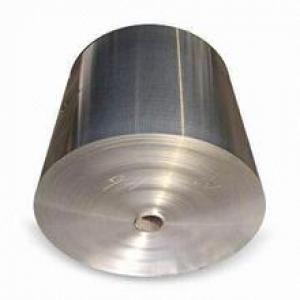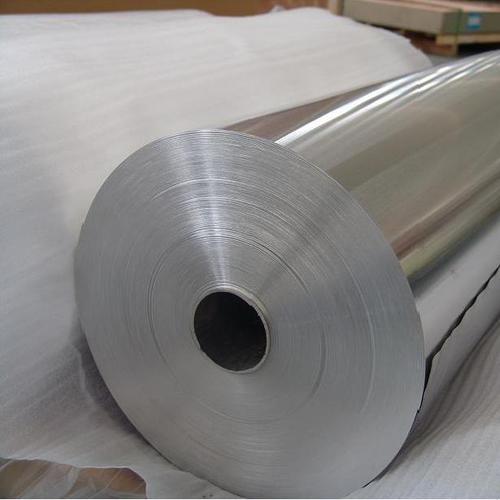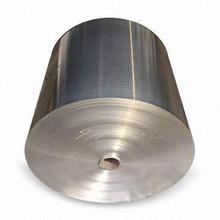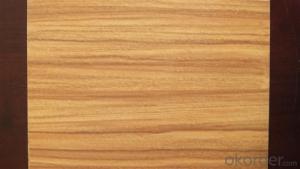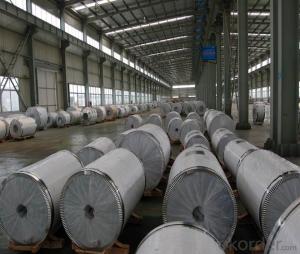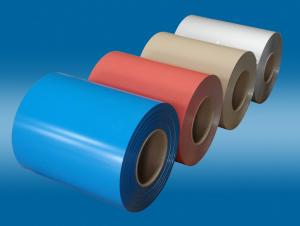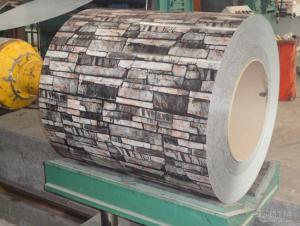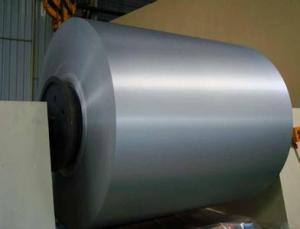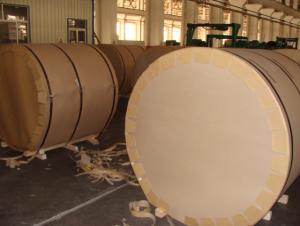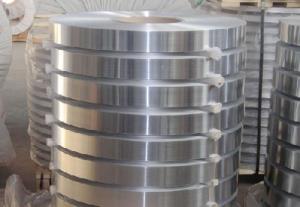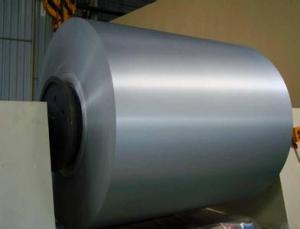ALUMINIUM COIL 1xxx
- Loading Port:
- China Main Port
- Payment Terms:
- TT or LC
- Min Order Qty:
- 8 m.t.
- Supply Capability:
- 2000 m.t./month
OKorder Service Pledge
OKorder Financial Service
You Might Also Like
Structure of Aluminium Coil Description:
Aluminium coil/sheet are of a wide range of specifications, and they are widely used in:
Interior: wall cladding, ceilings, bathrooms, kitchens and balconies, shutters, doors...
Exterior: wall cladding, facades, roofing, canopies, tunnels,column covers , renovations...
Advertisement: display platforms, signboards, fascia, shop fronts...
Main Features of Aluminium Coated Coil :
1) High gloss
2) High flexibility
3) Impact resistance
4) Excellent weather-proof durability
5) Anti-ultraviolet
6) High erosion resistance
7) Stable color and gloss
8) Good mechanical processing performance
9) Abrasion resistance
Image of Aluminium Coil:
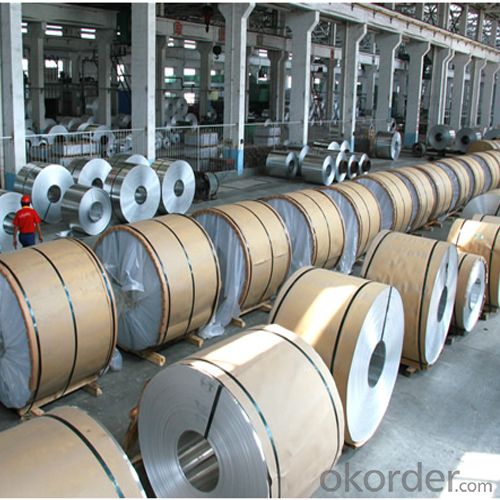
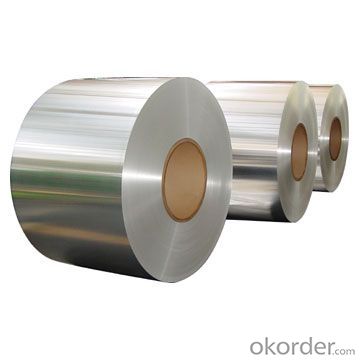
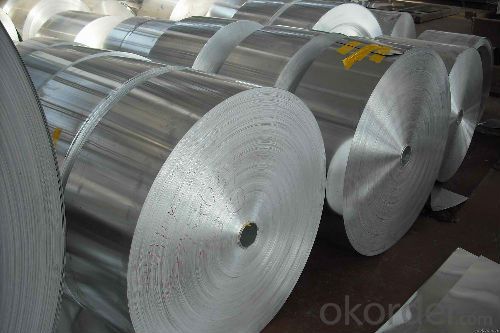
FAQ of Aluminium Coil:
a.What is monthly capacity
---CNBM is one stated own company and our monthly capacity is about 2000tons.
b. Now which countries do you export your goods?
---Now we export to South East Asia,Africa, North America,South America ect.
- Q: Can aluminum coils be used in the production of heat exchanger fins?
- Yes, aluminum coils can be used in the production of heat exchanger fins.
- Q: What are the transportation and storage requirements for aluminum coils?
- There are several factors that determine the transportation and storage requirements for aluminum coils. Firstly, it is crucial to handle the coils with caution during transportation in order to avoid any harm. Secure packaging is necessary to prevent potential scratches, dents, or deformation. Additionally, safeguarding the coils from moisture is essential as exposure to water or high levels of humidity can result in corrosion. During transportation, it is advisable to employ appropriate vehicles or containers that can sufficiently support the weight and dimensions of the aluminum coils. The coils should be firmly secured to prevent any movement or shifting that may cause damage. Regarding storage, it is of utmost importance to store aluminum coils in an area that is clean, dry, and well-ventilated. Ideally, the storage facility should maintain a stable temperature and humidity level to prevent any negative effects on the coils. If the coils are stored outside, they should be adequately covered and protected from direct sunlight, rain, and other weather conditions. Furthermore, it is crucial to store aluminum coils away from any substances or chemicals that may cause damage. They should be stored in a manner that prevents contact with other materials, as physical contact can lead to scratching or other types of damage. In summary, the transportation and storage requirements for aluminum coils involve careful handling, protection from moisture and corrosive materials, proper packaging and securing during transportation, and storage in a clean and suitable environment. By adhering to these guidelines, the integrity of the aluminum coils can be preserved, ensuring their quality and usability.
- Q: Are there any health or safety concerns related to aluminum coils?
- There are no significant health or safety concerns directly associated with aluminum coils. Aluminum is a common material used in various industries, including HVAC systems. It is lightweight, durable, and corrosion-resistant. However, it's important to ensure proper ventilation and avoid exposure to high concentrations of airborne aluminum dust or fumes, as excessive inhalation or ingestion might pose some health risks. Nonetheless, in typical applications, aluminum coils do not pose any significant health or safety concerns.
- Q: Are there any specific guidelines for the storage of aluminum coils?
- Yes, there are specific guidelines for the storage of aluminum coils. Here are some key considerations: 1. Location: Aluminum coils should be stored in a clean, dry, and well-ventilated area. The storage facility should be free from excessive humidity, direct sunlight, and temperature fluctuations. 2. Handling: Coils should be handled with care to prevent damage. They should be lifted using appropriate lifting equipment to avoid any bending or deformation. 3. Stacking: When stacking aluminum coils, it is important to ensure that they are properly supported to prevent any distortion or collapse. Coils should be stacked horizontally on a flat surface, ideally on pallets or racks, with sufficient space between each coil to allow for ventilation. 4. Protection: Coils should be protected from dust, dirt, and moisture. They should be covered with a suitable protective material, such as plastic sheets or tarpaulins, to prevent any contamination or oxidation. 5. Labeling and organization: It is recommended to label each coil with relevant information, such as the alloy type, size, and production date. This facilitates easy identification and inventory management. Additionally, maintaining an organized storage system helps prevent damage and allows for efficient retrieval. 6. Inventory management: Regular inspection and inventory checks should be conducted to identify any signs of damage or deterioration. Coils should be rotated to ensure proper usage and prevent any prolonged storage that could lead to quality issues. It is important to note that these guidelines may vary depending on the specific requirements of the manufacturer or supplier. Therefore, it is advisable to consult the manufacturer's recommendations or seek professional advice for the storage of aluminum coils.
- Q: Are there any specific guidelines for the handling of aluminum coils?
- There exist specific guidelines for the handling of aluminum coils, with several key points to consider: 1. Appropriate lifting techniques: To handle aluminum coils, it is crucial to utilize suitable lifting equipment such as cranes or forklifts. These tools must possess the capacity to handle the weight of the coils in order to prevent accidents or damage. 2. Usage of protective gear: Workers must wear personal protective equipment (PPE) like gloves and safety goggles to safeguard themselves against sharp edges or potential injuries during handling. 3. Secure packaging: Aluminum coils must be stored or transported in secure packaging to prevent damage. This can be accomplished by employing suitable pallets, straps, or protective covers to ensure that the coils are held in place and protected against external factors like moisture or impact. 4. Proper stacking: When storing or transporting aluminum coils, it is vital to stack them in a manner that guarantees stability and prevents them from falling or causing accidents. The coils should be stacked evenly and securely, with adequate support and spacing between each stack to avoid deformation or damage. 5. Avoidance of contact with corrosive materials: Aluminum coils should not come into contact with corrosive materials such as acids or alkalis, as they can cause damage or corrosion to the metal. It is important to store aluminum coils in a clean and dry environment to preserve their quality. 6. Gentle handling: Aluminum coils are prone to scratches, dents, and other forms of damage, thus they should be handled with care to avoid these issues. Dragging or sliding the coils during handling should be avoided, and they should be placed gently to prevent any potential damage. 7. Training and supervision: Workers involved in the handling of aluminum coils should receive adequate training and supervision to ensure adherence to the specific guidelines and safety procedures. Regular training sessions can help refresh their knowledge and reinforce safe handling practices. By adhering to these guidelines, the proper handling of aluminum coils can be ensured, thereby reducing the risk of accidents, damage, or loss of quality.
- Q: What are the different surface treatments for aluminum coils?
- There are several different surface treatments available for aluminum coils, each offering unique properties and benefits. Some common surface treatments for aluminum coils include: 1. Mill Finish: This is the untreated, raw surface of aluminum coils that comes directly from the mill. It has a slightly rough texture and is typically used in applications where aesthetics are not a primary concern. 2. Anodized Finish: Anodizing is an electrochemical process that creates a protective layer on the surface of the aluminum coil. This treatment enhances corrosion resistance, improves durability, and provides a wide range of color options. 3. Painted Finish: Aluminum coils can be coated with various paint systems to enhance their appearance and protect against corrosion. Painted finishes offer a wide range of colors, gloss levels, and textures, allowing for customization according to specific design requirements. 4. Polished Finish: Polishing is a mechanical process that creates a smooth and reflective surface on the aluminum coil. This treatment is often used in decorative applications, where a high-quality and aesthetically pleasing finish is desired. 5. Brushed Finish: Brushing involves mechanically brushing the surface of the aluminum coil to create a pattern of fine parallel lines. This treatment provides a unique texture and is commonly used in architectural and interior design applications. 6. Embossed Finish: Embossing is a process of creating raised or recessed patterns on the surface of the aluminum coil. This treatment adds texture, enhances strength, and can be used for decorative purposes or to improve grip in certain applications. 7. Laminated Finish: Lamination involves applying a layer of protective film or coating on the surface of the aluminum coil. This treatment provides additional protection against scratches, abrasion, and UV rays, making it suitable for outdoor applications. Each surface treatment option has its own advantages and is chosen based on the specific requirements of the application, such as corrosion resistance, durability, aesthetics, and functionality.
- Q: Can aluminum coils be used in heat exchanger fins?
- Indeed, heat exchanger fins can utilize aluminum coils. Aluminum is widely preferred for heat exchangers owing to its remarkable thermal conductivity, lightweight properties, and resistance to corrosion. By incorporating aluminum coils into heat exchanger fins, the transfer of heat between two fluids becomes highly efficient, making it an ideal material for this specific purpose. Moreover, aluminum coils can be effortlessly shaped into different fin configurations, which allows for design flexibility and maximizes the surface area for heat transfer. All in all, aluminum coils are commonly employed in heat exchanger fins to boost heat transfer efficiency and enhance the overall performance of the heat exchanger system.
- Q: How are aluminum coils tested for surface adhesion?
- Aluminum coils are tested for surface adhesion through various methods to ensure the quality and performance of the material. One common method is the tape test, where a piece of adhesive tape is applied firmly to the surface of the coil and then quickly removed. The adhesion is evaluated by assessing the amount of coating or paint that comes off with the tape. If excessive coating is removed, it indicates poor surface adhesion. Another method involves using a cross-cut or knife test, where a grid pattern is cut into the surface of the coil using a sharp blade. The grid is then covered with an adhesive tape and quickly removed. The adhesion is evaluated by examining the amount of coating or paint that is removed from the cut lines. If there is minimal or no coating removal, it indicates good surface adhesion. In addition, the pull-off adhesion test is often conducted using specialized equipment. This test involves attaching a device to the surface of the coil and applying a gradually increasing force until the coating or paint starts to detach. The force required to cause the detachment is measured, and it provides a quantitative measure of the surface adhesion strength. Overall, these testing methods help manufacturers assess the surface adhesion of aluminum coils and ensure that they meet the required standards for various applications, such as in the automotive, aerospace, or construction industries.
- Q: What specific conditions or precautions are necessary to ensure the proper storage of aluminum coils to maintain their quality and prevent damage?
- <p>Yes, there are special requirements for storing aluminum coils to ensure their quality and prevent damage. Aluminum coils should be stored in a cool, dry place away from direct sunlight and moisture. They should be kept on flat, level surfaces with proper support to prevent warping or denting. It's also important to avoid stacking them too high to prevent crushing. Additionally, coils should be protected from contact with corrosive materials or chemicals that could cause oxidation or staining. Proper labeling and tracking of coils is also essential for inventory management.</p>
- Q: Is it possible to utilize a magnetic stirrer to determine the magnetic characteristics of an aluminum coil?
- <p>No, you cannot use a magnetic stirrer to test the magnetic properties of an aluminum coil. Aluminum is a non-magnetic material, meaning it does not respond to magnetic fields in the way magnetic materials like iron, nickel, or cobalt do. A magnetic stirrer operates by creating a rotating magnetic field to stir substances, but since aluminum is non-magnetic, it will not be affected by the stirrer's field. To test magnetic properties, you would need to use materials that are ferromagnetic or paramagnetic, or employ other methods such as a magnetometer for measuring magnetic fields.</p>
Send your message to us
ALUMINIUM COIL 1xxx
- Loading Port:
- China Main Port
- Payment Terms:
- TT or LC
- Min Order Qty:
- 8 m.t.
- Supply Capability:
- 2000 m.t./month
OKorder Service Pledge
OKorder Financial Service
Similar products
Hot products
Hot Searches
Related keywords

